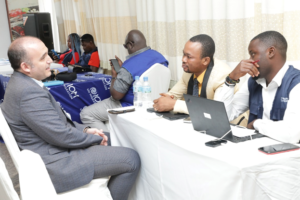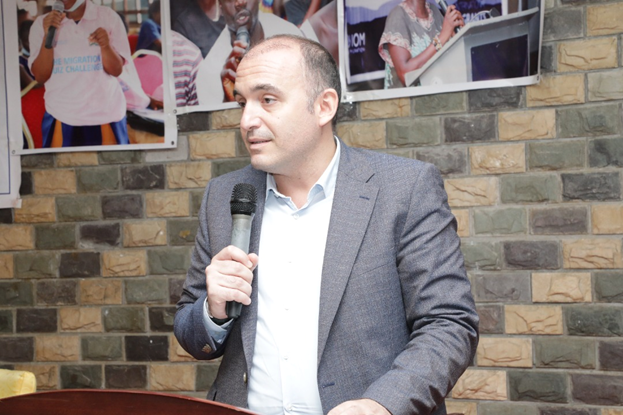By Allieu S. Tunkara
Countless number of youthful Sierra Leoneans have been lost to the currents of the Mediterranean Sea and the heat of the Sahara deserts while on risky trips to Europe via Libya, Morocco, Algeria and other countries in Africa. Desperate for a better life, the Youth drive roughshod to make it to Europe and Asia amid deadly conditions. The move is an irregular migration which Sierra Leone has been grappling with for years.
In recent years, Sierra Leone was tagged as transit point and springboard for irregular migrants costing the country million dollars of aid money. Sierra Leone, in 2020, lost Millions of US dollars under the Millennium Challenge Corporation owing to Irregular Migration factor.
She was placed at Tier-2 Watch list which is dangerous for a country that is badly in need of development. To ensure that Sierra Leone is saved from the grip of irregular migration, The Migrants as Messengers (MaM) project was initiated to stop young men and women from travelling overseas by irregular means.
MaM is a peer-to-peer awareness raising campaign that empowers young people in West Africa to make informed decisions about migration. It is funded by the Deutch Government and Implemented by IOM. The benefits associated with MaM are many and varied. Returned migrants in the MaM volunteer network participate in regular training sessions building skills to carry out the campaign.
These sessions include video production, interview techniques and digital engagements. Specialised training in such areas of interest as theatre production and journalism are also offered. The campaign is being implemented in Cote d’voire, the Gambia, Guinea, Liberia, Nigeria, Senegal and Sierra Leone.
In this project, Victims of irregular migration who have returned home are identified and employed as volunteers by the International Organisation for Migration. The MaM volunteers play an active part in informing the youth in various communities in Sierra Leone about their terrible circumstances and failed trips to Europe. Social media platforms noatbly Facebook and Whatsapp were used to reach a large audience as an effective means of awareness-raising.
Research has shown that potential migrants have general distrust for institutional information campaigns, but are more likely to believe in information from their own social networks. MAM relies on authentic first-person testimonies that aim to achieve behaviour change through emotional identification and information designed through social media networks.
Under the MaM project, volunteers have prepared and produced 1, 099 peer-to-peer videos to discourage their peers to go into irregular migration schemes. The volunteers help those who want to make such desperate trips know that they have a future in their own country. 381 MaM volunteers have been trained, peer-to-peer events held, 383, 267 participants involved, 3.2M digital engagements held and 66 journalists partnered with for the dissemination of accurate information on the project.

By such effective awareness raising schemes, The MaM project has recorded notable achievements as assessment scores indicate. Findings from the first impact evaluation indicated that peer-to-peer approach works, and that empowering returnees is important at individual and community levels. It also shows that potential migrants exposed to the campaign were 19% more informed about the risks and opportunities associated with irregular migration, and 25% more aware of the multiple risks also associated with the perilous journey.
20%, the evaluation exercise also notes, are less likely to report intentions to migrate irregularly within the next two years. The evaluation findings are used to continually refine and improve the campaign’s design and complemented by regular post-activity surveys of the target audience. The 2018 impact evaluation, first of its kind in the field of migration, has been followed up by four additional evaluations on MaM in the Gambia, Guinea, Nigeria and Senegal in 2021. The results will be available in late 2022. Meanwhile, the results are encouraging and worthwhile, Sierra Leone moved out of Tier-2 watch list in 2021.
She has maintained such status with huge prospect to change the narrative for the better. After three years of implementation, MaM project has ended Thursday September 8, 2022.
Project officials, volunteers and financiers converged at the Bintumani Hotel in Freetown yesterday to showcase gains made over the years. A Media Speed Date platform where the media interacted with MaM volunteers was created.
The victims narrated their horrific experiences while in a strange land. In light of their nightmares, they now see no fortune in going to Europe through irregular means. Statements were made by head of IOM in Sierra Leone, Christos Christodoulides reminding government and the international community about few Sierra Leoneans with the zest to enter Europe by all means and all cost.
“A generation of migrants is on the move in West Africa in the hope of finding a better life for themselves and their families back home,” The IOM chief said. Sierra Leone has been a key participant in the move to Europe. Chistoloudlides presented a grim statistics of Sierra Leoneans who have been helped to safely return home by IOM. “In 2021, an estimated 146,043 irregular migrants arrived in Europe,” The IOM chief emphasised.
Out of those figures, 112, 747 used the sea route while 33, 296 travelled by land to reach Europe. None of these irregular migrants will escape the Mediterranean Sea and the Sahara Dessert where most lost their lives. Libya, in North Africa, Christoloudlides went on, was an important transit point with an estimated number of 610, 000 migrants in the same year.
He also noted that while most migration in West Africa is intraregional, an increasing number of sophisticated smuggling and trafficking networks lure young people into undertaking the dangerous journey Northwards but also to the Middle East. Sierra Leone is no exception to the irregular migration scheme.
IOM has estimated that 8, 000 to 10, 000 young people are leaving the country irregularly every year. Most do not make it to their final destinations. They are trapped in their transit points before they are deported or repatriated to Sierra Leone. Stranded in foreign countries, the only organisation, the migrants could turn to for solace is the IOM.
The agency has, over the years, provided support to 7, 761 Sierra Leonean since 2017 out of which 1, 474 was in 2022. Most are protection cases and victims of human trafficking. Executive Director for Women and Girl Child Network Against Irregular Migration, Mariama Bundu also highlighted success her organisation has made since it came into existence.
He however noted challenges that still lie ahead, and called for support. Mariama, a victim of trafficking formed the organisation after she was brought back home. She appealed for funding so that she could go ahead with her sensitization campaign in the absence of MaM.
Sheku Bangura who also heads similar agency also pointed out his contributions he has made towards the mitigation of irregular migration. Dramas by volunteers that depicts horrific experiences on the ‘Temple Run’ also formed part of the ceremony.


